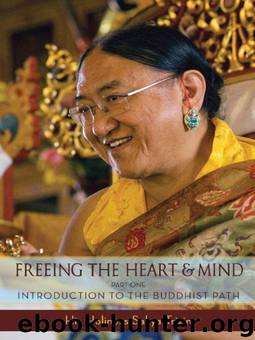Freeing the Heart and Mind: Introduction to the Buddhist Path by Trizin Sakya

Author:Trizin, Sakya [Trizin, Sakya]
Language: eng
Format: azw3
Publisher: Perseus Books Group
Published: 2011-05-01T03:00:00+00:00
Creation of enlightenment mind
The second part of the preliminary section of the teaching involves switching from the lower path to the higher path by generating enlightenment mind.
Buddhists believe in rebirth. This can be logically understood in the following way. We all have both a body and a mind. We can see and touch the physical body and describe its size, color, and shape. However, the mind is very different. We cannot see or touch it, or describe its color and shape. Because the body and mind are so very different, the mind cannot arise primarily from a physical body, from the elements, or from ordinary matter. It must arise from a continuity similar to itself.
We can describe where our physical bodies come from, how they are maintained, and how they will eventually be disposed of. But the mind cannot be disposed of in the way that we dispose of our physical body. The mind continues, and therefore it must come from the same type of continuity as itself. It must be a continuity that reaches back before our present body or life. If we go back from this life to the previous life, to the life before that and so on, there is no end. There is no original starting point.
This is what is meant by the phrase “since beginningless time.” Each of our minds has continued since beginningless time. From beginningless time until now, we have been caught up in this cycle of existence. Since we have been here throughout beginningless time, there is not a single place where our body has not been born. There is not a single being that has not at one time been our very dear mother, father, and relatives.
Because of the changes that come with taking a new life, we no longer recognize each other. We see some of these dear ones as our enemies, some as our relatives, and some as neutral beings toward whom we are indifferent. But in reality, every single sentient being at one time or another has been our very dear relative, not only once but countless times. Each time, they gave us so much love, and cared for and benefited us just as our present dear ones have done.
Therefore, it is not right to seek liberation or enlightenment only for ourselves alone, ignoring the welfare of all these very dear mother sentient beings. We must care for them. The way to do this is to rescue them from the suffering of samsara and lead them to the path of happiness.
Because we are ordinary people, however, we have neither the freedom nor the ability to rescue them. Even powerful worldly deities and those who have already reached the nirvana of self-liberation do not have the power to save all sentient beings. Only fully enlightened buddhas can save all sentient beings. Therefore, for the benefit of all sentient beings, we wish to attain perfect enlightenment. This thought is known as enlightenment mind, or bodhichitta.
Enlightenment mind has two aspects: wishing enlightenment mind and engaging enlightenment mind.
Download
This site does not store any files on its server. We only index and link to content provided by other sites. Please contact the content providers to delete copyright contents if any and email us, we'll remove relevant links or contents immediately.
The Way of Zen by Alan W. Watts(6614)
Ego Is the Enemy by Ryan Holiday(5450)
The Art of Happiness by The Dalai Lama(4130)
The Book of Joy by Dalai Lama(3986)
Why Buddhism is True by Robert Wright(3454)
Spark Joy by Marie Kondo(3303)
Shift into Freedom by Loch Kelly(3199)
Happiness by Matthieu Ricard(3050)
A Monk's Guide to a Clean House and Mind by Shoukei Matsumoto(2915)
The Lost Art of Good Conversation by Sakyong Mipham(2654)
The Meaning of the Library by unknow(2572)
The Unfettered Mind: Writings from a Zen Master to a Master Swordsman by Takuan Soho(2311)
The Third Eye by T. Lobsang Rampa(2269)
Anthology by T J(2215)
Red Shambhala by Andrei Znamenski(2200)
The Diamond Cutter by Geshe Michael Roach(2062)
Thoughts Without A Thinker: Psychotherapy from a Buddhist Perspective by Epstein Mark(2028)
Twilight of Idols and Anti-Christ by Friedrich Nietzsche(1894)
Advice Not Given by Mark Epstein(1881)
